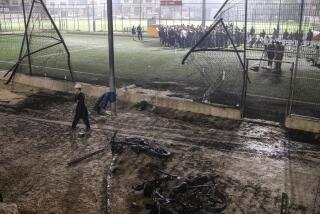General: Asteroid Blast Could Spur Atomic War
- Share via
WASHINGTON — Asteroids regularly explode over the Earth with the intensity of a nuclear bomb, and there is a chance the explosions could be mistaken for a nuclear attack, possibly triggering an atomic war, an Air Force general said Thursday.
At least 30 times a year, a space rock measuring a few yards across slashes into the atmosphere and explodes, releasing energy equal to that of an atomic bomb, Brig. Gen. Simon P. Worden told members of a House science subcommittee.
Worden, deputy director for operations of the U.S. Strategic Command, said the U.S. has satellite instruments that determine within a minute whether the blast is a nuclear weapon or a natural explosion from an asteroid.
But no one else has such technology, he said, and without it, some countries could conclude the explosions came from a nuclear bomb and could launch an atomic attack against an enemy.
For instance, he said Pakistan and India, both of which have nuclear capabilities, were at full alert in August, poised for war.
Not far away, a few weeks before, Worden said, U.S. satellites detected over the Mediterranean an atmospheric flash that indicated “an energy release comparable to the Hiroshima burst.” Air Force instruments quickly determined that it was caused by an asteroid 15 feet to 30 feet wide.
The blast received little or no notice, he said, but it possibly could have caused a major human conflict had it occurred over India or Pakistan while those countries were on high alert.
“The resulting panic in the nuclear-armed and hair-triggered opposing forces could have been the spark that ignited a nuclear horror we have avoided for over half a century,” he said.
Worden said the Air Force’s early warning satellites in 1996 detected an asteroid burst over Greenland that released energy equal to about 100,000 tons of explosives. He said similar events are thought to have occurred in 1908 over Siberia, in the 1940s over Central Asia and over the Amazon basin in the 1930s.
“Had any of these struck over a populated area, thousands and perhaps hundreds of thousands might have perished,” he said.
Worden said the current generation of early warning satellites does a good job of detecting asteroid bursts in the atmosphere and that new equipment will be even better. He said the Air Force is working on an asteroid alert program that would quickly send information from the satellites to interested nations.
More to Read
Sign up for Essential California
The most important California stories and recommendations in your inbox every morning.
You may occasionally receive promotional content from the Los Angeles Times.













